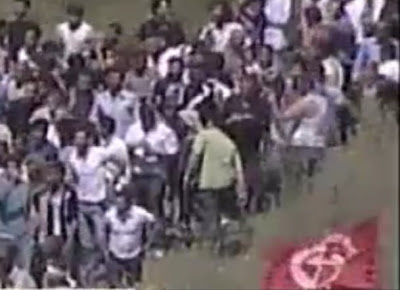Despite reports suggesting the mass rallies planned in Syria and Lebanon to mark "Naksa Day" – the 44th anniversary of the Arab "downfall" in the Six Day War – were cancelled, some 500 people gathered Sunday on the Syrian side of the northern border.Reuters confirms that the Syrians stoned soldiers and that the IDF warned them against approaching.
According to reports, around 12pm, about 150 protesters made their way to the international border fence, began stoning IDF troops and attempted to cut through the fence.
IDF forces called on the demonstrators to cease their progress, before firing warning shots in mid-air. Once those were ignored as well, the troops fired at the lower extremities of several major dissidents inflaming the crowds.
Unconfirmed reports by Syrian media suggest three people were killed and 10 others injured, allegedly from IDF sniper fire. Red Cross Ambulances evacuated the injured.
The IDF has not confirmed any information about casualties.
Syrian TV is now saying 4 were killed, a number not confirmed by any independent observers.
Even though there were reports on Saturday that Syria would stop any protesters from approaching the border, the Syrian SANA news agency reported yesterday of one group that was preparing to go - and from the article, it is obvious that this was a Syrian-sponsored incursion:
Popular Commission for the Liberation of Golan on Saturday stressed determination to return and continue the liberation process.Notice that this group is not calling for "return" of Palestinian Arabs to Israel, but of Syria re-occupying the Golan. In fact, this press release is exactly congruent with Syrian government propaganda, which shows that this group that approached the border was only acting under the orders - and assistance - of the Syrian government itself.
In a statement marking the 44th anniversary of "al-Naksa Day", the Commission added "the conspiracy against Syria targets undermining its stability and security in an attempt to separate Syria from the Arab resistance through preoccupying with an internal affair."
The statement indicated to the Zionist entity and its inhuman practices of forcing the people of Golan to leave their lands and destroying towns and farms which stress Israel's racism and inhumanity.
The Commission stressed the Golan people's support to the reform program under the leadership of President Bahar al-Assad, expressing faith in Syria's resistant policy and the certainty of victory.
The statement pointed out that the Naksa Day anniversary should be a motive for exerting more effort to continue the struggle to end the Zionist project and return to Golan.
The Commission saluted people in the Occupied Golan and the captives in the occupation jails.
I am not believing any reports of fatalities, since the Syrian regime has so much to gain by lying, and no one will be able to verify or contradict any Syria reports of deaths.
UPDATE: I see at least as many Syrian flags than Palestinian Arab flags on the live Israeli TV coverage of the Syrian border:

 Elder of Ziyon
Elder of Ziyon



























